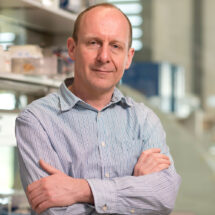
Felix Randow, a group leader in the LMB’s PNAC Division, has been elected into the Fellowship of the Academy of Medical Sciences.
The Academy represents the diversity of medical science, with Fellows drawn from a range of professions, including laboratory science, clinical academic medicine, medical and nursing care, as well as areas allied to medical science, such as ethics, social science and the law. Fellowship of the Academy is based on outstanding contributions to advancing medical science, either in the form of original discovery or of sustained contributions to scholarship. The Academy’s mission is to advance biomedical and health research and its translation into benefits for society.
Felix’s research focuses on cell autonomous innate immunity: the ability of individual cells to defend themselves against infection. In particular, his group is interested in the danger receptors that detect cellular invasion by bacteria, such as Salmonella, and in the system that marks these invading bacteria to be captured and degraded. Felix’s group have identified many of the component proteins involved in these processes and have made important contributions to our understanding of how the bacteria are detected and how this leads to recruitment and biogenesis of the autophagosome, a specialised vesicle in which the bacteria will be degraded. Felix’s group are also interested in how infection activates NF-kB and IRF signalling to lead to the gene expression changes required for defence against pathogens.
Felix joined the LMB as a Group Leader in 2003, after having completed his PhD at Humboldt University in Berlin and a post-doc at Harvard Medical School.
Felix becomes the 20th LMB scientist honoured by the Academy of Medical Sciences since its foundation in 1998. The new Fellows will be formerly admitted to the Academy at a ceremony on 26 June.
Further references
Felix’s group page
Academy of Medical Sciences
MRC Press Release
LMB Fellows of the Academy of Medical Sciences